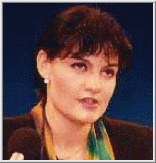YELENA MASYUK
YELENA MASYUK, correspondent for NTV, captured the world’s attention when she was kidnapped by Chechen armed rebels May 10 and held, along with her two crew members, for 100 days in harsh, inhumane conditions, most of the time in damp mountain caves. She had covered the Chechen war in 1994 for NTV and had endeavored “to show the Chechen side of the story, to give them a chance to tell their point of view, to show how terrible the war was for civilians and even Russian soldiers,” she told CPJ in a recent interview. It was Masyuk and NTV that provided the world with indepth coverage of the fighting in the breakaway republic, coverage that earned her Russia’s top television awards. It also earned her interrogation and threats from Russia’s intelligence services. And two weeks before she was taken captive, a right-wing Russian newspaper, Zavtra, carried a Russian colonel’s threat of physical harm to her for her critical coverage of Chechnya. Although pulled from the Chechen assignment for a time because of threats against her, Masyuk reluctantly agreed to venture into the secessionist region again in May on the eve of a peace treaty. 
Masyuk, cameraman Ilya Mordyukov, and sound engineer Dmitri Ulchev were released Aug. 18, the 101st day of their captivity, also the day of a meeting in Moscow between Russian President Yeltsin and President Aslan Maskhadov of Chechnya. Although the identity of her captors and the reason for her release are still unclear, one thing is certain: Yelena Masyuk is driven by a journalist’s need to report the story. “I want the exclusive story, the story that no one else would be able to get,” she told CPJ. Indeed, less than a month after her release from Chechnya, she was off again on assignment for NTV to Kamchatka, to report on the high cost but low standard of living in this remote wilderness region.
At 31, Masyuk is already a seasoned journalist renowned for her bold and objective reporting. A special correspondent for Russian independent television since 1994, she has, in addition to covering events in Russia’s “flashpoints in the ethnic conflict zones reported for NTV from Afghanistan, Tajikistan, Pakistan and Iran. A journalism graduate of Moscow State University, she was a media fellow in 1995 at Duke University’s DeWitt Wallace Center for Communications and Journalism. While in the United States in May 1996 she testified before Congress about dangers to journalists in the Chechen war zone. In a region characterized by partisan journalism where few women rise to prominence in the profession, Masyuk is an extraordinary exception.
| Links: |
Background
May, 10, 1997
Yelena Masyuk, NTV MISSING
Masyuk, her cameraman Mordyukov, and sound technician Olchev were abducted near the village of Samashki in western Chechnya on their way to neighboring Ingushetia in the Russian Federation.
Six masked gunmen ambushed the car in which the NTV journalists were traveling, then forced the journalists to another car and drove away. The driver was allowed to escape. At the time of the abduction, the crew had just finished filming a public rally and had interviewed rebel leader Salman Raduyev in central Grozny. They were leaving Chechnya with their videotapes. The kidnappers did not publicly demand ransom.
CPJ repeatedly issued appeals to Russian, Chechen, and U.S. officials regarding the case. NTV executives and Russian government officials have traveled to Chechnya to negotiate with the Chechen government, which first claimed to have no knowledge of the journalists’ location, then said on June 5 that the crew was being held in Grozny and periodically moved to different places.
Masyuk is a special correspondent for NTV known for her war coverage in Chechnya.
Masyuk, Mordyukov, and Olchev were released from Chechen captivity on Aug. 18, just hours before a Moscow summit between the Russian and Chechen presidents. The journalists returned to Moscow that day. The circumstances around their release was unclear; both Chechen and Russian authorities claimed responsibility for their release. NTV chief Igor Malashenko said he paid several million dollars in ransom to obtain their release. Chechen leaders said they carried out a rescue operation that left one soldier dead, but NTV denounced that claim as disinformation.
July 13, 1995
Yelena Masyuk, NTV LEGAL ACTION
The Russian general prosecutor’s office opened an investigation against Masyuk, a reporter for the independent television station NTV, for failing to provide information on the terrorist Shamil Basaev. The case was filed under Article 189 (harboring a criminal) and Article 190 (failure to report a crime) of the Criminal Code. The prosecutor accused Masyuk of not informing authorities of Basaev’s whereabouts during her June 25 interview with him in a population center in Nozhnay-Yurtovsky Rayon. The general prosecutor’s office completed the investigation by late August and decided not to press charges. It did request, however, that the Committee for Press and Information make a ruling about existing Russian law to prevent further such incidents. The Criminal Code requires anyone with information about a serious crime to report it or face legal prosecution.
|CPJ home | Attacks 1997 | Awards 1997 |Report a Journalist in Trouble |